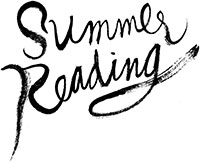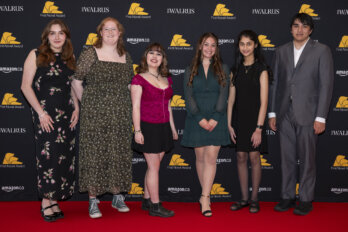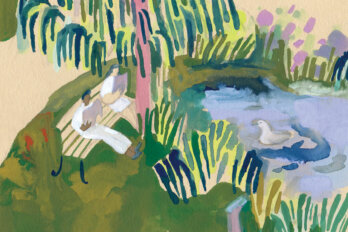
For a man who made his living seducing women, Fork wasn’t particularly good in bed. Susan and her friends, Lindy and Mai-Lin—women she’d known for a decade, known since high school, and who met up together somewhere foreign for a week of fruity drinks and catching up every year—had started calling him Fork the first afternoon at the beachside bar when, after a few hours of flirty chatting turned into heavy petting with Susan, he’d pulled back from her and said, abruptly and loudly, “And now we fork? ” He’d meant “fuck,” of course. Back home, which was Victoria for Susan, Toronto for Lindy, and Guelph for Mai-Lin, this would have been the moment the glistening cobwebs of alcohol stretched and broke. With the jet lag and the sun, which had worked its way through the women’s dutiful layers of SPF, Fork’s thick accent and directness seemed somehow charming, however. Susan had promptly paid the bar bill—at Fork’s direction—and left Lindy and Mai-Lin behind, her friends paired off with two of Fork’s buddies, men who spoke no English whatsoever and who, despite plenty of encouragement from the women, seemed firmly camped in the pre- stage of pre-coital interaction when Susan left.
Fork didn’t ask Susan for money directly, but he made it clear to her that night that he’d be pleased to spend the week at her service if she’d take care of the minor inconvenience of paying for meals and drinks, perhaps a little shopping. At breakfast the next morning, Mai-Lin chose a table without an umbrella so the women could sit in the full sunshine and see the men and boys who were already out on the waves. “At least he was subtle about it,” Mai-Lin said.
Susan picked up her water and took a sip. “What is it with these countries that don’t believe in ice cubes? ” She put the glass down and then stretched her arms out above her head. “And subtle? Really? ”
Jillian Tamaki
We asked five celebrated writers to devise five guidelines for composing a short story or poem. They all traded lists—and played by the rules.
Five Rules
by Sarah Selecky
- Start in the sun and end in the shade.
- Utilize the description of the taste of an apple (without using the words sweet, crunchy, tart, crisp, or sour).
- Have a character named (or nicknamed) Fork.
- Include a scene that involves dialogue, with the subtext “I will always love you, even if you don’t love me.”
- Be written in the objective point of view.
“I think she meant about the being a gigolo thing,” Lindy said. “I mean, comparatively speaking.” She’d already told Mai-Lin and Susan how, when Fork’s friend finished getting dressed, before he left Lindy’s room, he’d gone over to the dresser, picked up her purse, and casually liberated a few bills: “Not too much, nothing that seemed dreadfully unfair or anything, and probably less than I would have given him if he had asked—”
“He’d have to speak English to ask,” Susan said.
“—but the nakedness of it, the sheer presumption, was kind of stunning,” Lindy continued.
The waiter came over with a full smirk and their breakfasts, making no attempt to hide the way he looked down Lindy’s top as he leaned over her shoulder to deliver her plate. Lindy, who took lovers in the same way that she took streetcars, ignored the waiter. All three of them were attractive and confident, but Lindy in particular was particularly both, and finding men who were interested in having sex had never been a problem for any of them. It hadn’t been a problem in high school, when they all had serious boyfriends, or at university, when it was a little more swift and vicious, or afterwards, when they went their separate ways and it was something different for each of them. The past few vacations, with her new marriage, turned an ex-marriage as of four months ago, Mai-Lin had sat things out on the sidelines with Susan, and it had been Lindy alone coming to breakfast late, telling them of how this man had made growling sounds like a tiger, or how that man had started to cry after he finished.
“Well,” Mai-Lin said, “at least you got your money’s worth, Lindy.”
Lindy took a bite from the pastry. It was filled with some sort of fruit that was so red it was almost purple, and it smeared obscenely on her lips and then, when she wiped her lips, across the white cloth of her napkin. “I never get my money’s
worth, sweetie.”
Susan laughed and then blushed and turned to look out over the water. She watched a man walking on the beach with a small girl by his side. The girl couldn’t have been more than three or four, and she lagged a step behind the man, her hand pulled tight by his. “He’s coming by later this morning. Fork.”
“Perhaps he’ll bring his knife and spoon with him,” Lindy said.
“God. That’s what I miss the most, you know, about Trent,” Mai-Lin said. “Spooning. Just cuddling with him. I mean, last night was fun”—she’d already told Lindy and Susan how she’d only figured out what her man, who kept repeating “dive,” over and over again, that one word apparently the limit of his English, had meant, when he had disappeared under the covers almost as soon as they got in bed—“but he rolled over with his back to me and was snoring almost the second he was finished.”
“Just don’t fall in love with him,” Lindy said. That was one of her five rules for engaging in promiscuous behavior while on vacation. She broke the rules whenever she felt like it.
Susan started to rise from her chair and then stopped, sat back down. The girl on the beach had fallen, her hand slipping from her father’s, but she was already on her feet again, clumsily brushing the sand from her legs and arms. The man looked like he was laughing. “I don’t know why I told him to come over again. He wasn’t particularly good in the sack, you know. Competent, I guess.”
“Sometimes that’s better than nothing,” Lindy said. She took another bite of the pastry, this time daintily, and the fruit kept its juices off her face. “How’s Bert? ”
Just the name of Susan’s grandfather put a smile on all three women’s faces. By the time the girls were in high school, Bert had sold his medical practice and started his second career as a farmer. They’d worked part time at his orchards during the fall, high school girls helping the migrant crews, running the cider press, ringing up bags of U-Pick apples, and making fresh apple cider doughnuts in the small store. Bert had never remarried, and despite the fact that Susan’s dad had sided with Susan’s grandmother in the dissolution of the marriage, her dad hadn’t stopped Susan from spending time with Bert. Part of the reason all three of them liked Bert was that he seemed young for a grandfather, in his mid-sixties and energetic when Susan was in high school, and part of it was simply that he was a good man, the sort of man, his failed marriage notwithstanding, who was an almost comically perfect grandfather. Susan liked to tell the story about how, when she was ten or eleven, they’d been out hiking on the island when they saw a wild horse.
“I’d never seen a horse just out and about like that, and I’m still not even sure if it was somebody’s escaped pet or if it really was a wild horse—are there even wild horses on the island?—but he grabbed my arm and held me still and did this sort of clicking thing with his tongue, and the horse came over to us. And the thing that still blows me away, but seemed so incredibly normal to me at the time, like, this was just the kind of guy my grandfather is, he reached into his pocket and pulled out a sugar cube and put it in my hand. He spread my fingers flat and then the horse lipped it out of my palm. I mean, he just happens to have a sugar cube in his pocket? Did he always carry a sugar cube in his pocket? How did he know we’d see a horse? And what’s funny is that it wasn’t until years later, probably when I was already at university, that I figured out that it was kind of an amazing thing that he was somehow prepared for us to find a horse while we were out walking. Like he always expected something magical.”
Susan spread more jam on her toast. She hadn’t known what it was when she ordered, but the jam was strawberry, sweet and sticky. “Remember when he tried making that batch of apple butter and didn’t put any sugar in it? And you,” she said, looking at Mai-Lin, “were too polite to say anything. You just ate the whole biscuit, trying so hard not to look like you were eating, well, butter with apple chunks in it.”
“And then he took a bite and spit it out all over the table,” Mai-Lin said. She finished her glass of water and glanced around for the waiter. “God. It’s only ten and it’s this hot? What’s it going to be like in the afternoon? ”
Susan looked out at the beach again. The girl was sitting on the sand now, digging with her hands. Out in the waves, just up to his waist in the water, the man leaned down and dunked his head into the ocean. Susan lifted her hair up and twisted it into a makeshift bun, sweat already beading on her neck.
While Mai-Lin and Lindy were at the spa, Susan sat on the veranda outside her room, still groggy from her nap. The hotel fell into the boutique category, and the women had taken three adjoining rooms in one of the dozen or so semi-detached six-unit cabanas that had been carefully curated on the beach, separate from the main building. Fork had already come and gone, giving her another half-hearted effort in bed and taking some money so he could return with his friends, some wine, and what he promised were local delicacies only he could locate.
For some reason she couldn’t understand, despite the assurances of the tech support person she kept on part time for the business, her mobile didn’t work overseas. The cord on the hotel phone was long enough that by arranging her chair just so, she was able to sit on the veranda while the lonely digital chirp of her call rang through at her grandfather’s house outside Victoria. After the fifth ring, just before the answering machine usually kicked in—her grandfather continued to refuse to get voice mail—she heard her husband’s voice.
“Oh,” she said. “It’s me. I didn’t expect you to be there.”
There was a pause, just long enough that it was not clear if it was an actual hesitation or a transatlantic delay, and then her husband spoke: “I didn’t either. I brought her back after dinner and there was a hell of a rainstorm starting to blow up. Bert convinced me I’d be better off spending the night than trying to drive back to the city.” He didn’t say anything about the way the driveway of the farm became thick with mud when it stormed, or how the wind could blow apples loose so that they knocked dents into cars that weren’t parked with sufficient foresight.
Susan reached out with her feet, but she couldn’t quite escape the shade from the roof of the veranda. “You’re going to be late for work.”
“No. My appointment with the lawyer’s this morning. And I figured I’d drop her off at school as long as I was still here. We were heading out the door. She’s already out in the car.”
Susan stood up, the base of the phone cradled against her chest. She leaned on the doorway and looked out over the beach. It was almost empty, the heat and late afternoon sun burning out the tourists. On the path from the hotel, she saw Fork turn the corner. He had canvas grocery sacks in either hand. They looked heavy.
“I don’t have to sign the papers, Susan.” She didn’t say anything. She just watched Fork amble toward her. He looked at ease with himself, despite the bags he was carrying, and as he spotted her his face broke into a gap-toothed grin. “Susan? Are you still here? ” She hugged the base of the phone tighter against her breasts, but still she didn’t speak. “Susan? I’ll sign if that’s still what you want. Are you there? I’m still here.” His voice faded a little as he said the words.
Fork paused at the bottom of the steps and cocked his head to the side, but in the bright sun, he suddenly looked older than he had the day before, in his late thirties or forties, instead of Susan’s age. He smiled again and then came up the steps. Susan heard her husband’s voice one last time, asking, “Are you still there? ” before she carefully placed the receiver back on the base.
“Your husband? ” Fork said. “Back home? ”
Susan crouched down and put the phone on the floor. “How did you know? ”
He put the bags on the floor next to her, and she saw several bottles of wine, a few containers, a loaf of bread, flowers. Instead of standing, she let herself sag all the way to the ground, and after a moment Fork sat down next to her. He shrugged. “You look as if it is husband,” he said. “You still in love with him. I know this.”
She looked out on the beach, but it seemed empty. Even the waves had taken a break from the heat, barely scuffing at the sand. “Yes. Something like that,” she said.
They had been sitting quietly for long enough that it passed from awkward to comfortable, when Fork brightened and reached into one of the bags. He pulled out a cloth wrapped square and unwrapped it to show her a yellow dish, a golden crust with an ooze of apple poking through. “For you,” he said. “My mother, she make for me to bring to you.” He reached back into the bag. “Fork,” he said, holding the fork and the tart out to her. She laughed when he said “fork,” but didn’t explain anything, just took the tart and the fork and held them in front of her. The tart was still warm. She took a big bite, a piece of apple sliding off and falling on the floor next to her.
“Good? Yes? ” Fork said. “Of course it is good. My mother is good baking.”
She chewed and then sucked at the apple and the crust. “It’s bright,” she said. “The apple. It tastes bright.”
“Bright? ” Fork leaned in and kissed her neck, put his hand on her thigh, running it under her sundress.
“It tastes bright. Like the sun,” Susan said. She squinted out at the ocean and then shifted her legs to make things easier for Fork. “Like home.”
This appeared in the July/August 2011 issue.





